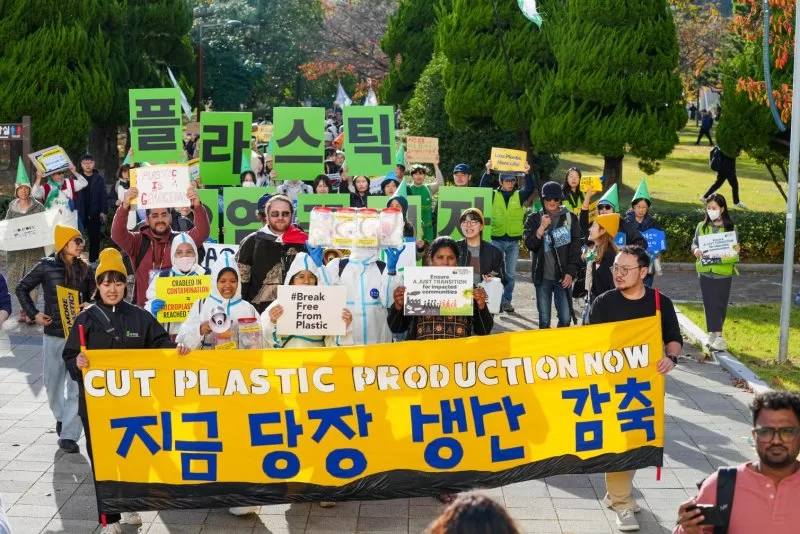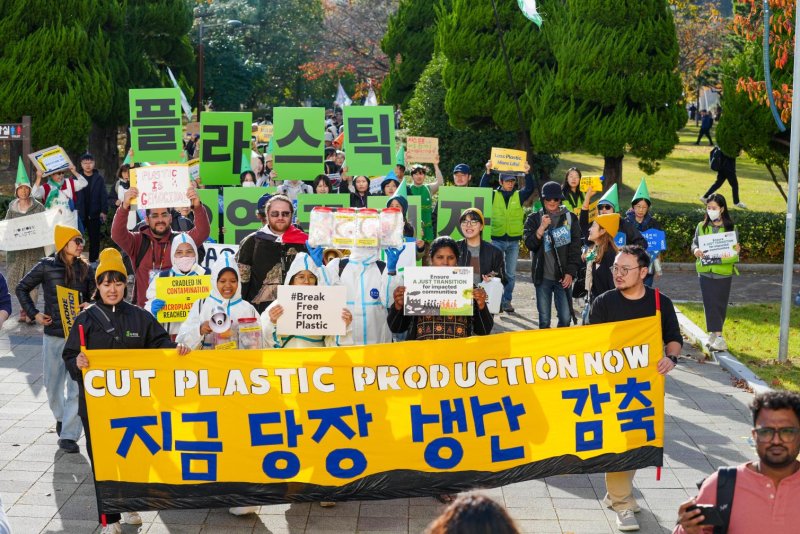Activists hold a rally in Busan during the International Negotiating Committee on Plastic Pollution, which concluded early Monday without an agreement. Photo by Seunghyeok Choi/ Break Free From Plastic and Uproot Plastics Coalition
SEOUL, Dec. 2 (UPI) — Delegates from more than 170 countries attempting to negotiate a treaty to curb global plastic pollution ended a weeklong meeting in Busan early Monday without an agreement, pushing talks to another session next year.
Nations at the fifth meeting of the U.N.-led Intergovernmental Negotiating Committee on Plastic Pollution could not come to terms on defining targets and approaches to reach the goal of reducing plastic waste.
The key sticking point centered around regulations against the production of plastics and plastic polymers, along with disputes around measures to regulate hazardous chemicals that go into making plastics and funding mechanisms.
More than 100 nations showed support for a resolution led by Panama that would cap the production of new plastics. However, a handful of oil-producing countries such as Saudi Arabia and Russia, along with petrochemical trade groups, wanted to focus only on managing plastic waste through means such as recycling.
The meeting was adjourned with a text by INC-5 chairman Luis Vayas Valdivieso which will serve as the basis for future negotiations.
“This week’s meeting has made good progress towards securing the deal the world demands,” Inger Andersen, executive director of the U.N. Environment Program, said. “But it is clear there is persisting divergence in critical areas and more time is needed for these areas to be addressed.”
In March 2022, the U.N. Environment Assembly adopted a resolution calling for the development of an instrument to control plastic pollution by the end of 2024
Every year, up to 23 million tons of plastic waste leaks into lakes, rivers and seas, according to UNEP, altering habitats and posing severe risks to wildlife and human health. Microplastics have been found in food, water, soil and human organs — even placenta.
Civil society and environmental activist groups expressed dismay at the lack of a treaty, pointing to the outsized influence of the petroleum and chemical industry at the talks, while vowing to keep up the pressure for an ambitious solution.
Yuna Lee of South Korea-based Our Sea of East Asia Network said that the outcome displayed “the prioritization of capital over human rights, the theft of language cherished by human rights advocates, and the distortion of scientific evidence for political gain.”
“While some hold the health and rights of humanity and the environment hostage, we remain united, refusing to turn away from the escalating plastic crisis that demands urgent action,” Lee said in an emailed statement.
The nonprofit Center for International Environmental Law reported last week that fossil fuel and chemical industry lobbyists formed the largest single delegation at the Busan talks, outnumbering all the representatives from the European Union.
“This is not just an environmental crisis. It is a moral failure,” Panamanian delegate Juan Carlos Monterrey Gómez said at the INC-5 closing plenary on Sunday.
“We came to Busan with a mission: to define a global pathway to end plastic pollution,” Gómez said. “We did not achieve what we came for, a binding treaty that addresses the full life cycle of plastics, of which production is a part.”
However, the coalition of over 100 nations that signed the Panamanian resolution offers “small glimmers of progress” for the future, he added.
“The momentum is with this overwhelming majority, even if the challenges are still daunting,” Gómez said.

